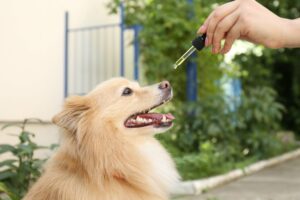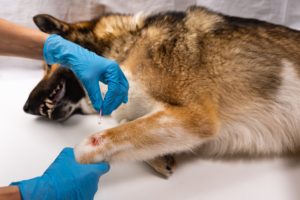Top Holiday Pet Hazards and Safety Tips
 As the holiday season approaches, homes all over Florida are filled with festive decorations, mouth-watering treats, and the joyful spirit of celebration. However, amidst these holiday delights, it’s crucial for pet owners to be mindful of potential hazards that could affect their furry friends. In this post, we’ll explore some common holiday pet hazards and provide essential safety tips to keep your pets safe and happy.
As the holiday season approaches, homes all over Florida are filled with festive decorations, mouth-watering treats, and the joyful spirit of celebration. However, amidst these holiday delights, it’s crucial for pet owners to be mindful of potential hazards that could affect their furry friends. In this post, we’ll explore some common holiday pet hazards and provide essential safety tips to keep your pets safe and happy.
Festive Foods
The holiday season brings an array of delicious foods, but not all are safe for pets. Foods to avoid include:
- Chocolates
- Xylitol (found in sugar-free treats)
- Grapes
- Raisins
- Onions
- Certain nuts
Always keep these foods out of reach and ensure your pet sticks to their regular diet.
Decorative Dilemmas
Decorations add a magical touch to the season but pose risks to curious pets. Tinsel, if ingested, can cause intestinal blockage, while holiday lights can lead to electrical shocks if chewed. Additionally, plants like poinsettias, mistletoe, and holly are toxic to pets. Opt for pet-safe decorations and keep hazardous plants out of paw’s reach.
Stress and Anxiety
The hustle and bustle of the holidays can be overwhelming for pets. Loud noises, unfamiliar guests, and disruptions in routine can cause stress and anxiety. Provide a quiet space for your pet to retreat to, and maintain their regular feeding and exercise schedule as much as possible.
Gift Wrappings
Wrapping paper, ribbons, and bows are intriguing to pets but can lead to choking or intestinal blockages if ingested. Clean up promptly after gift exchanges and monitor your pets when they’re around these materials.
Cold Weather Considerations
In Tampa, while we enjoy milder winters, the occasional cold snap can still affect our pets. Ensure they have a warm, cozy place to sleep and limit their exposure to chilly temperatures, especially for short-haired breeds.
Come to Affordable Pet Hospital With Any Holiday-Related Issues
The holidays are a time for joy and celebration, but keeping our pets safe should always be a top priority. By being aware of these potential hazards, you can ensure a happy and healthy holiday season for your entire family, including your four-legged friends.
If you have concerns about your pet’s health this holiday season, have an emergency, or simply need advice on keeping them safe, don’t hesitate to reach out. Tampa Bay pet owners can contact us or request an appointment by calling 813-991-9898 or online. Let’s work together to ensure a safe and festive holiday season for your pets!

 As the cooler months roll in, we see more and more pets coming into the office with common winter illnesses. Even though our winters don’t get so cold here, pet owners must still be diligent about monitoring their pets for symptoms. In this post, we’ll explore a few of the most common pet illnesses during winter and how to handle them.
As the cooler months roll in, we see more and more pets coming into the office with common winter illnesses. Even though our winters don’t get so cold here, pet owners must still be diligent about monitoring their pets for symptoms. In this post, we’ll explore a few of the most common pet illnesses during winter and how to handle them. Ringworm
Ringworm As a responsible dog owner, it is essential to be aware of the potential health issues that can affect your furry friend. One common condition that can impact dogs is
As a responsible dog owner, it is essential to be aware of the potential health issues that can affect your furry friend. One common condition that can impact dogs is  For people, it is not uncommon for a medical doctor to recommend taking a multivitamin, along with other possible vitamins. So you may be wondering if this same advice would be beneficial to your pet. Just like with humans, there isn’t a one-size-fits-all answer. While vitamins may benefit some pets, they could harm others. Consulting with
For people, it is not uncommon for a medical doctor to recommend taking a multivitamin, along with other possible vitamins. So you may be wondering if this same advice would be beneficial to your pet. Just like with humans, there isn’t a one-size-fits-all answer. While vitamins may benefit some pets, they could harm others. Consulting with  Pet owners know their pets are prone to cuts, scrapes, and other wounds. However, the frequency with which these injuries occur might surprise you. Wounds can range from a shallow cut to a deep gash that exposes bone or even tendons. They can bleed profusely or not at all. They can be clean (no dirt or debris in the wound) or contaminated (soil, debris, bacteria on the wound). Depending on the extent of skin damage and contamination, wounds can heal quickly or require more extensive care and time to heal completely. In general, it’s always best to have veterinary advice when caring for your pet if you are unsure about anything related to your pet’s wound or its treatment. However, there are some general guidelines for wound care in dogs and cats that are good to know. Read on to learn how to manage your pet’s next cut, abrasion, or laceration so that it heals as quickly and thoroughly as possible.
Pet owners know their pets are prone to cuts, scrapes, and other wounds. However, the frequency with which these injuries occur might surprise you. Wounds can range from a shallow cut to a deep gash that exposes bone or even tendons. They can bleed profusely or not at all. They can be clean (no dirt or debris in the wound) or contaminated (soil, debris, bacteria on the wound). Depending on the extent of skin damage and contamination, wounds can heal quickly or require more extensive care and time to heal completely. In general, it’s always best to have veterinary advice when caring for your pet if you are unsure about anything related to your pet’s wound or its treatment. However, there are some general guidelines for wound care in dogs and cats that are good to know. Read on to learn how to manage your pet’s next cut, abrasion, or laceration so that it heals as quickly and thoroughly as possible. According to the Arthritis Foundation, around 20% of dogs have
According to the Arthritis Foundation, around 20% of dogs have  Puppy breath is adorable, but adult dog breath? Not so much. But even though your older dog’s breath might not smell like roses, it shouldn’t stink either. If it does, it could be a sign of bigger problems.
Puppy breath is adorable, but adult dog breath? Not so much. But even though your older dog’s breath might not smell like roses, it shouldn’t stink either. If it does, it could be a sign of bigger problems. Did you know that your pets can have seasonal allergies just like humans? Allergic rhinitis, also known as hay fever or seasonal allergies, is very prevalent in pets, especially dogs. Any dog can have these allergies, but they are especially prevalent in pit bulls, boxers, bichon frises, cocker spaniels, German shepherds, and Golden retrievers.
Did you know that your pets can have seasonal allergies just like humans? Allergic rhinitis, also known as hay fever or seasonal allergies, is very prevalent in pets, especially dogs. Any dog can have these allergies, but they are especially prevalent in pit bulls, boxers, bichon frises, cocker spaniels, German shepherds, and Golden retrievers. As a committed and compassionate pet owner, you want to do everything you can to keep your furry family members healthy and happy. One of the best ways to do this is to keep up with
As a committed and compassionate pet owner, you want to do everything you can to keep your furry family members healthy and happy. One of the best ways to do this is to keep up with 